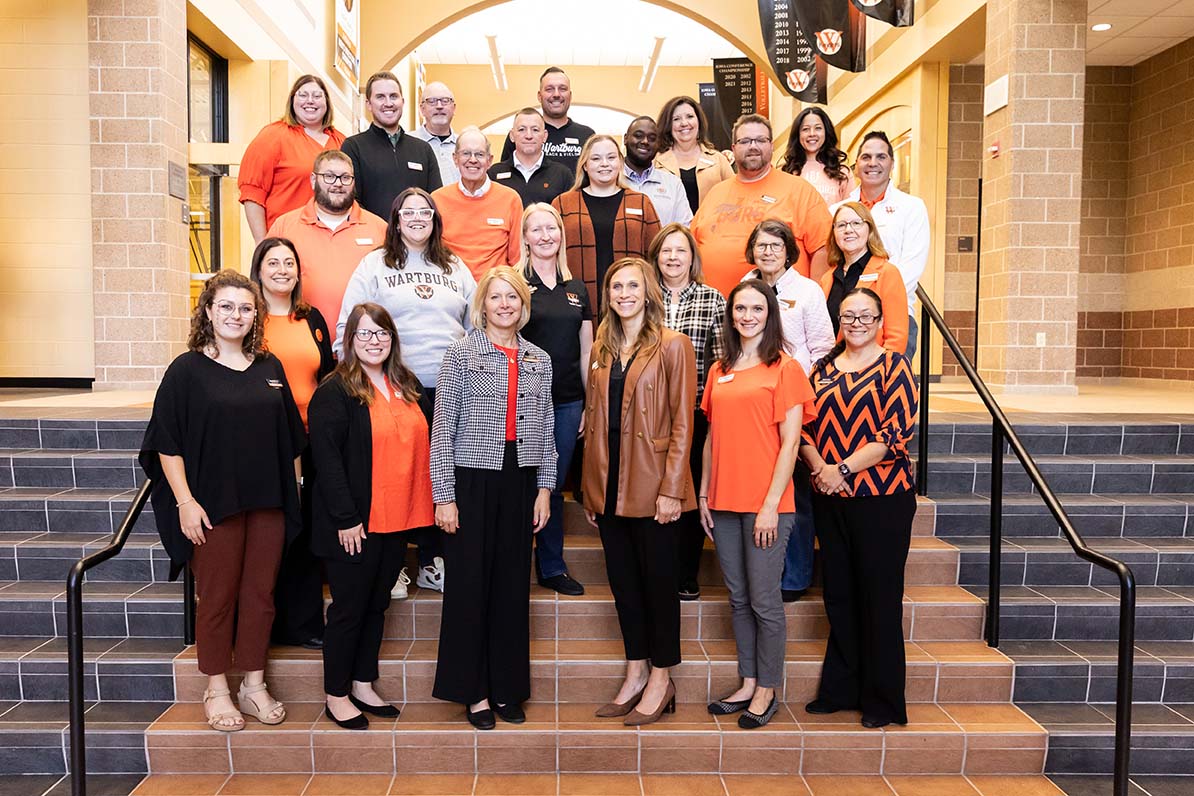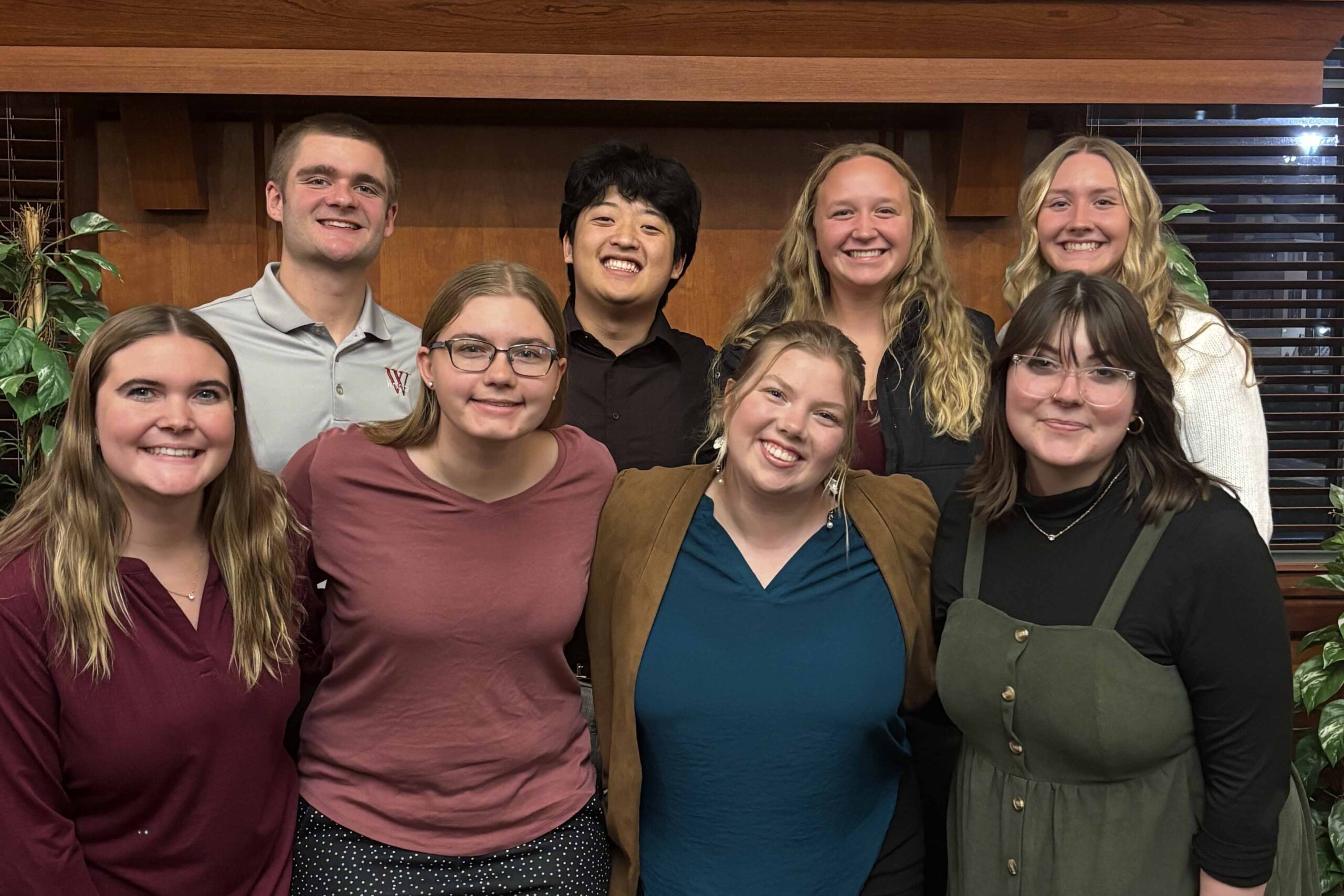
Financial Aid
We understand the significance of financial aid in your college journey and are committed to guiding you through this process. The Wartburg Financial Aid Office is happy to assist with FAFSA filing questions or other college financial guidance. Please use the information below to connect with one of our knowledgeable financial aid counselors.
Your Next Step: Complete the FAFSA
This allows us to add other funds to your financial aid package. Be sure to list Wartburg College code #001896.
Contact Us: (319) 352-8262 or finaid@wartburg.edu
Regardless of your financial standing, we are committed to making education attainable for you. As a residential college, Wartburg supports the concept of a socially, culturally, and economically diverse student body and believes this diversity better prepares students for society. The college provides financial aid to enable students from all segments of society to attend. Wartburg believes that students should be able to select a school for academic rather than financial reasons and admits students on academic and personal promise, not the ability to pay.
- Costs & Payment Options
- Guides & Resources
- International Aid
- Loan Information
- Policies & Forms
- Scholarships & Grants
- Financial Aid Staff
How will the ‘Big Beautiful Bill” affect financial aid?
Reconciliation legislation nicknamed the “One Big Beautiful Bill Act” was signed into law on July 4, 2025. Most provisions are scheduled to take effect on July 1, 2026, so we do not anticipate any changes to 2025-26 financial aid packages. Click for details about the bill.
Learn through experience.
The Knight’s Experience provides up to $1,500 in one-time funding for all Wartburg students during their second, third, or fourth year to support an experiential learning opportunity. Qualifying programs include internships, study away, research projects, service trips, and more.
Wartburg is grateful to the Jack and Sarah Salzwedel family
for funding the Knight’s Experience for the 2026-27 academic year.
Financial Aid Policies
Funds and Eligibility
Most financial aid funds come from the federal government, the State of Iowa, Wartburg College and private donors. Each aid program has specific eligibility requirements. In general, all students must meet the following requirements to receive financial assistance through Wartburg College.
- Be enrolled on a full-time basis—a minimum of three course credits for institutional funds and three and one half course credits for full consideration of federal grants.
- Be a U.S. citizen or eligible non-citizen for federal assistance.
- Be admitted to Wartburg as a degree seeking student.
- Maintain satisfactory academic progress.
- Meet eligibility requirements for each of the aid programs accepted.
- Not be in default on any educational loan or owe a refund for a grant.
- Demonstrate financial need or meet special scholarship requirements.
The financial aid award is subject to the availability of expected federal and state funds. Institutional grants and scholarships require full time enrollment and must be applied toward tuition. The combination of institutional and state funds, including the Iowa Tuition Grant, cannot exceed tuition. Please note that Wartburg institutional funding is available for eight terms. The longevity of Wartburg institutional funding for transfer students will be prorated based on their class status upon enrollment.
Notification of Award: We accept applications throughout the year, giving priority consideration to students who apply before March 1. Prospective students who have completed their FAFSA may receive their financial aid offer as soon as January 1. Existing Wartburg students are encouraged to complete their FAFSA by March 1 and will be notified of their awards beginning in April. Current Wartburg students can check for any missing documents or the status of their award by accessing Net Partner.
Awarding Aid Criteria: Institutional merit scholarships are awarded based on a prospective student’s academics. For a first year student, this includes the most recent high school grade point average (GPA), class rank, and ACT or PSAT score. A transfer student is evaluated based on his/her most recent GPA from the college or university he/she is currently attending.Secondly, a student is awarded based on his or her financial need according to the results of the Free Application for Federal Student Aid (FAFSA). These results are used to calculate and award federal, state and institutional need based grants and loans.
Financial Aid Grievance Process (PDF)
In an effort to help identify sources of assistance or procedures to follow when a student has a financial aid complaint or grievance, the following process has been outlined.
Definition: Confirming the accuracy of information entered by a student on the FAFSA by requesting documentation from the student as required by the federal government. According to federal regulations, the following items must be verified.
- Household Size
- Number in College
- Adjusted Gross Income (AGI)
- US (federal) taxes paid
- Certain types of untaxed income and benefits
One third of all students submitting a Free Application for Federal Student Aid (FAFSA) are selected at random for verification. An institution of higher learning is required to verify any FAFSA selected by the processor. If selected, you will be notified by the processor after submitting the FAFSA. Prospective students are further notified by the Wartburg Financial Aid Office (FAO) with instructions for completing the process when they register to attend the Student Orientation, Advising and Registration (SOAR) day. Returning students will be notified by an email from the FAO. The FAO will not prepare an award package for a returning student until the verification process is complete. Wartburg verifies the above information with the collection of the following documents.
- Verification Worksheet – students will need to download and print the appropriate worksheet from the list found online. If you are an independent student please contact the Financial Aid Office.
- Parent IRS Tax Return Transcript for the appropriate tax year.
- Student IRS Tax Return Transcript for the appropriate tax year.
- Copy of all parent and student W-2 forms for the appropriate tax year
No federal or state financial aid can be distributed to the student’s account until the process is complete. The above required documents can be sent by postal mail or fax.
Wartburg College Financial Aid
100 Wartburg Blvd.
Waverly, IA 50677
Fax # 319-352-8247
After completion of the verification process the student will be notified by email of any changes that are made to their FAFSA information and previously awarded financial aid.
The following addresses refund and repayment of aid received by students who cease to be enrolled prior to the end of a payment period. This policy is effective only if the student completely withdraws from all classes. (An exception is if the student withdraws during a payment period which is made up of modules and communicates in writing that he/she will return for a later module within that same payment period. Wartburg College’s (WC) winter and May term are a payment period with two modules.)The withdrawal date for the calculation of the return of Title IV funds, state funds (if applicable) and institutional aid is based on the following:
- The last date of attendance at an academic related activity, or
- The date the student officially notifies the institution of his/her intent to withdraw, or
- The date determined by Wartburg as the administrative withdrawal date, if the student has left without notifying the College, based on a determination of the last academically-related activity, or
- If none of the above three situations apply then the midpoint of the enrollment period for students who leave without notifying the institution (an unofficial withdrawal).
Earned Federal Aid Calculation
When a recipient of title IV grant or loan assistance withdraws from WC during a payment period in which the recipient began attendance, WC will determine the amount of title IV grant and/or loan assistance that the student earned as of the student’s withdrawal date. The amount of federal financial aid that is considered “earned” is pro-rated according to the percentage of the payment period completed. Once a student has completed 60 percent of the payment period, 100% of the student’s federal financial aid assistance has been earned. Since the institutional and state calculation is handled differently than the federal calculation during the Winter/May term enrollment period, the 60% point of the payment period will be different for each type of aid.
Return of Funds Allocation
Federal financial aid funds are returned In accordance with Federal regulations, in the following order if applicable:
- Federal Direct Unsubsidized Stafford Loan
- Federal Direct Subsidized Stafford Loan
- Federal Perkins Loan
- Federal PLUS (Parent) Loan
- Federal Pell Grant
- Federal SEOG
- Federal TEACH Grant
- Iraq and Afghanistan Service Grant
Funds received from the state (if applicable) and the institution are also returned based on the percentage of the enrollment period completed.
Pro-rated Institutional Charges
When a student withdraws, the Business Office completes a calculation to determine the student’s pro-rated charges. Tuition charges are pro-rated using the percentage of the payment period completed. Certain fees are not pro-rated. Housing and food plan charges are pro-rated based on the day the student terminates their food plan and officially checks out of their residence hall. View entire Return of Title IV Funds/Institutional Refund Policy (PDF)
Withdrawal from the College
A student who plans to leave the college after the start of a new term and not return the following term must fully withdraw. The withdrawal process begins in the Registrar’s Office. This ensures correct reimbursement, proper recording of the student’s grades, clearance of encumbrances against the student’s record, and adjustments to financial aid. Withdrawing before the end of the term may impact the student’s bill and financial aid. Students who withdraw and decide to return may re-enroll as a returning student by contacting the Registrar’s Office.
Click here for the Policy for Students Called to Active Military Duty.
All students receiving financial assistance, regardless of their academic program or enrollment status, are required to maintain satisfactory academic progress (SAP) during their enrollment at Wartburg College (WC). This progress is measured by a qualitative (GPA) and quantitative (PACE) component. SAP is achieved when a student maintains both the required grade point average (GPA) and the required completion rate (PACE). Please note that this is the SAP policy for determining federal, state and institutional financial aid eligibility. Merit scholarships may have further maintenance criteria beyond SAP requirements. Academic policies that relate to probation and dismissal from WC may differ.
Undergraduate students are monitored at the end of each academic term (fall, winter/May, summer). Graduate students are monitored annually, at the end of the academic year.
Required GPA (Qualitative Measure): The undergraduate student must maintain at least the GPA as designated in the chart below to maintain SAP.
| Course Credits Completed | Required GPA | Pace (earned/attempted) |
|---|---|---|
| Course Credits Completed: 0.25-6.75 | Required GPA: 1.60 | Pace (earned/attempted): 67% |
| Course Credits Completed: 7.00-15.75 | Required GPA: 1.80 | Pace (earned/attempted): 67% |
| Course Credits Completed: 16.00-25.75 | Required GPA: 2.00 | Pace (earned/attempted): 67% |
| Course Credits Completed: 26.00+ | Required GPA: 2.00 | Pace (earned/attempted): 67% |
Graduate students must maintain a cumulative 3.0 GPA.
Required Pace (Quantitative Measure): In addition to maintaining the GPA specified above, both undergraduate and graduate students must be progressing toward completion of a degree program within a specified time frame. In order to meet these minimum requirements, a student must complete two-thirds, or 67%, of all cumulative attempted course credits to maintain SAP. Completed course credits are considered “earned” if a student successfully passes said course credits.
Required Pace (Quantitative Measure): In addition to maintaining the GPA specified above, both undergraduate and graduate students must be progressing toward completion of a degree program within a specified time frame. In order to meet these minimum requirements, a student must complete two-thirds, or 67%, of all cumulative attempted course credits to maintain SAP. Completed course credits are considered “earned” if a student successfully passes said course credits.
Notification of Failed SAP: If the student does not meet one or both of the SAP requirements, the student receives an email notification including the results of the evaluation and how aid eligibility is impacted.
Financial Aid Warning: If a student falls short of the GPA requirement or the 67% completion rule (PACE), the student will be placed on Financial Aid Warning for the following academic term. During the warning period a student will be able to receive financial assistance. Graduate students do not have a warning status because their SAP is reviewed once per year.
Financial Aid Probation: If an undergraduate student fails to successfully meet either of the SAP requirements after the next academic term of enrollment (the term of the warning period) or the graduate student fails to meet either SAP requirement at the end of the academic year, financial assistance will be suspended. (Suspension of aid is not the same as academic suspension which is handled by the Academic Dean’s office.) At this point a student will need to submit an appeal and create an academic plan with the Academic Resource Center.
Submitting an Appeal: A student must appeal in writing, noting extenuating circumstances, such as the death of a family member or an illness or injury to the student if applicable. All appeals MUST include information regarding why the student failed to make SAP, and what has changed in the student’s situation that will allow the student to demonstrate SAP after the next academic term of enrollment.
The appeal MUST also include an academic plan which will outline how the student will improve GPA and increase cumulative course credits to get back on track in seeking his/her degree. The student must be able to demonstrate that it is reasonably possible to get back on track towards successful program completion while staying within the 150% rule mentioned below. The Academic Resource Center will assist the student in creating an appeal and academic plan through the Turning Point program.
The Academic Resource Center will review the student’s appeal and academic plan and notify the Financial Aid Office of its completion. Once a student is granted an appeal, he/she will be placed on Financial Aid Probation. Financial aid will be reinstated, and the Academic Resource Center will monitor the student’s academic plan at the end of each enrollment period. If the student strays from the plan, he/she will again have all financial assistance suspended for the following academic term and will be required to submit an appeal and recreate an academic plan if appropriate. Generally, a maximum of four appeals will be allowed within eight consecutive terms for undergraduates. Graduate students can appeal once.
Maximum Timeframe – 150% Rule: Students also cannot receive financial assistance for any coursework beyond 150% of the course credits that are required for their specific program. Students enrolled in any of the Bachelor’s Degree programs at Wartburg may receive financial assistance for a maximum of 54 attempted course credits at either a part-time or full-time pace to be considered making progress under the 150% rule (36 undergraduate course credits required for graduation x 150% = 54 course credits). Simply stated, a student cannot receive financial assistance for any course credits that are in excess of 54 unless completing a combination of two Bachelor programs. Please see the chart below for the maximum credits/time frame for which each program may receive financial assistance dollars.
| Program | Undergrad Course Credits | 150% maximum course credits for SAP |
|---|---|---|
| Program: Bachelor of Arts | Undergrad Course Credits: 36 | 150% maximum course credits for SAP: 54 |
| Program: Bachelor of Applied Arts | Undergrad Course Credits: 36 | 150% maximum course credits for SAP: 54 |
| Program: Bachelor of Applied Science | Undergrad Course Credits: 36 | 150% maximum course credits for SAP: 654 |
| Program: Bachelor of Music | Undergrad Course Credits: 36 | 150% maximum course credits for SAP: 654 |
| Program: Bachelor of Music Education | Undergrad Course Credits: 36 | 150% maximum course credits for SAP: 54 |
| Program: Combination of Bachelor Programs | Undergrad Course Credits: 45 | 150% maximum course credits for SAP: 67.5 |
| Program | Graduate Semester Hours | 150% maximum course credits for SAP |
|---|---|---|
| Program: Master of Arts in Leadership | Graduate Semester Hours: 30 | 150% maximum course credits for SAP: 45 |
| Master of Science in Sport Science & Data Analytics | Graduate Semester Hours: 33 | 150% maximum course credits for SAP: 49.5 |
| Program: Master of Science in High Performance | Graduate Semester Hours: 36 | 150% maximum course credits for SAP: 54 |
Incomplete Grades: An incomplete or not reported grade of “I” or “NR” will be treated as a failing grade in the cumulative GPA. An incomplete or not reported grade will cause the course to count as attempted but not earned therefore affecting the pace calculation. If a grade is later given for the course, it is the student’s responsibility to notify the office of financial assistance so that academic progress may be reassessed.
Withdrawals: Course credits from which the student has withdrawn or received a grade of “W” will be counted as attempted credits for purposes of determining academic progress.
Pass/Fail (P/D/F): Courses taken on a pass/fail basis are included in the pace calculation with the exception of pre-requisite courses such as Math 90.
Audit: Courses that are audited without a grade are not included in the financial aid SAP calculations.
Repeated Coursework: When a student repeats a course, the most recent grade received will be used in the calculation of the cumulative GPA. Each time the course is taken, the credits for the course will count as attempted credits.
Transfer Students: Transfer credits that are accepted at WC will be counted as both total attempted and total earned credits in determining whether the student is maintaining satisfactory academic progress and thus also count towards the maximum 54 credits and will be used in the 67% rule (PACE) calculation.
Non-Enrolled Courses: Only credits earned from a course in which the student was actually enrolled are counted in calculating SAP. Advanced Placement credits, CLEP credits, credits earned from challenge exams, proficiency exams, or life experience are not used in calculating SAP.
Changes in Major or Degree or Certificate Program: A student who changes majors will still be required to stay within the maximum 54 attempted course credits to receive financial assistance.
Re-establishing Eligibility: A student who has lost financial assistance eligibility, can regain eligibility by making up deficiencies while not receiving aid. It is the student’s responsibility to notify the office of financial assistance to request aid be reinstated when this has been accomplished.
Note: All students will receive an email notification each year when their financial aid award is complete. Access before then will result in an incomplete award. Incoming students with questions should contact their admissions counselor. Returning students should use the link to determine their missing documents. Click here for consumer information.








